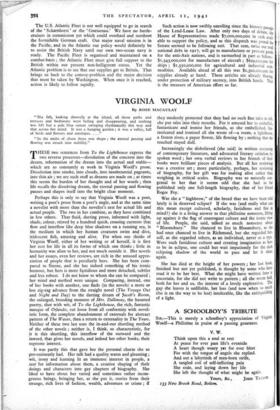VIRGINIA WOOLF
By ROSE MACAULAY "She felt, looking drowsily at the island, all those paths and terraces and bedrooms were fading and disappearing, and nothing was left but a pale blue censer swinging rhythmically this way and that across her mind. It was a hanging garden ; it was a valley, full of birds and flowers and antelopes. . . ."
"In the midst of chaos there was shape ; the eternal passing and flowing was struck into stability."
THESE two sentences from To the Lighthouse express the two reverse processes—dissolution of the concrete into the dream, reformation of the dream into the actual and stable— which are so constantly at work in Virginia Woolf's prose. Dissolution into smoke, into clouds, into insubstantial pageants, into thin air ; we are such stuff as dreams are made on ; at times this seems the burden of her thought and of her words ; then life recalls the dissolving dream, the eternal passing and flowing pauses and shapes itself into the bright clear moment.
Perhaps this is only to say that Virginia Woolf was a poet, writing a poet's prose from a poet's angle, and at the same time a novelist with more than the novelist's zest for actual life and actual people. The two in her combine, as they have combined in few others. That fluid, darting prose, informed with light, shade, colour, stirred by a hundred quick, crossing currents that flow and interflow like deep blue shadows on a running sea, is the medium in which her human creatures swim and dive, iridescent fish, amusing and alive. For when one thinks of Virginia Woolf, either of her writing or of herself, it is first her zest for life in all its forms of which one thinks ; little in humanity was alien to her, and not much outside it. Her novels and her essays, even her reviews, are rich in the amused appre- ciation of people that is peculiarly hers. She has been com- pared to Sterne, and she has indeed something of his ironic humour, but hers is more fastidious and more detached, subtler and less robust. I do not know to whom she can be compared ; her mind and method were unique. Comparing, instead, one of her books with another, one finds (in the novels) a more or less zig-zag advance from the straight novel (The Voyage Out and Night and Day) to the darting dream of Pcob's Room, the enlarged, brooding moment of Mrs. Dallcrway, the haunted poetry, shot with wit, of To the Lighthouse, the rich, fantastic masque of Orlando, cut loose from all conformity with novel- istic form, the complete abandonment of externals for abstract pattern of The Waves, then a return to externality in The Years. Neither of these two last uses the in-and-out shuttling method of the other novels ; neither is, I think, so characteristic, for it is this shuttling, this interflow of the outward and the inward, that gives her novels, and indeed her other books, their supreme interest.
It was partly this that gave her the personal charm she so pre-eminently had. Her talk had a quality warm and gleaming ; wit, irony and learning lit an immense interest in people, a zest for information about them, a creative shaping of their doings and characters into gay chapters of biography. She liked to have about her varied and sometimes rather incon- gruous beings, bringing her, as she put it, stories from their strange, rich lives of fashion, wealth, adventure or crime ; if they modestly protested that they had no such fine tales to tell, she put tales into their mouths. For it amused her to embellish, fantasticate and ironise her friends, as she embellished, fan- tasticated and ironised all she wrote of—a room, a lighthouse, a frozen river, a paper flower, life flowing by ; nothing that she touched stayed dull.
Increasingly she disbelieved (she said) in written reviewing of contemporary literature, and advocated literary criticism by spoken word ; her own verbal reviews to her friends of their books were brilliant pieces of analysis. But all her reviewing was a creative art ; more particularly, perhaps, her reviewing of biography, for her gift was for making alive rather than weighing in critical scales. Biography was so naturally con- genial to her that it seems odd that she had so far published only one full-length biography, that of her friend Roger Fry.
Was she a "highbrow," of the breed that we have been told lately is in deserved eclipse? If she was (and really what can this mean except cultured, scholarly, fastidious and fine in mind?) she is a living answer to that philistine nonsense, lifting up against it the flag of unarrogant culture and the ironic view of life. People, she said, talked so much nonsense about "Bloomsbury." She chanced to live in Bloomsbury, as she had once chanced to live in Richmond, but she regarded her- self, as she regarded others, as an individual, never as a type. Were such fastidious culture and creating imagination as hers to be in eclipse, one could but wait impatiently for the dark eclipsing shadow of the world to pass and let it shine again.
She has died at the height of her powers ; her last bank, finished but not yet published, is thought by some who have read it to be her best. What she might have written later Is uncertain, for she did not write to pattern ; all she wrote had, both for her and us, the interest of.a lovely exploration. The gap she leaves is =finable, her loss (and now when so much of a light. else is on the way to be lost) intolerable, like the extinguishing






























 Previous page
Previous page